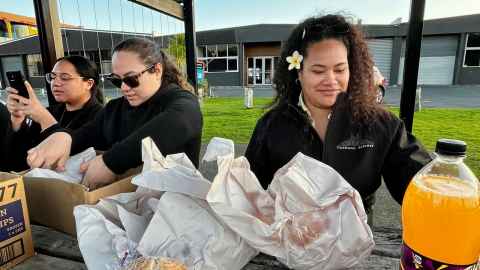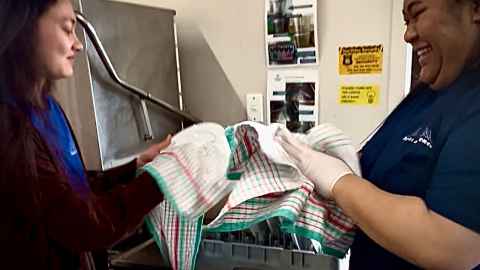Casting their nets at Te Puna o Te Matauranga Marae
10 September 2025
Tuākana science mentors test new skills at Pūtaiao Research Symposim.

Ka pū te ruha, ka hao te Rangatahi - When the old net is cast aside, the new net goes fishing.
The newly launched Waipapa Taumata Rau, University of Auckland Tuākana Science programme was put to the test at the recent Pūtaiao Research Symposium in Whāngarei on 4-5 September.
Co-designer Darlene Cameron (Te Aupōuri, Ngāti Kurī), Kaitiaki and Team Leader for Māori and Pacific Learning and Teaching Development, says tauira (students) who successfully completed the 12 week course earlier this year, did the University proud.
The course equipped them with practical tools and cultural knowledge, to help successfully navigate university life; they were also introduced to marae protocol.
“I was proud to see our tauira step up with confidence to navigate the marae environment. There’s no substitute for experience and they showed they weren’t afraid to be involved, where they were unsure, they knew to ask for guidance,” says Darlene.
She says the efforts of the group helped to elevate the mana of kaumatua and speakers, during the event held at NorthTec’s Te Puna o Te Mātauranga Marae. They supported the running of the symposium including tasks such as presenting keynote speakers with gifts following the conclusion of their sessions, while also showing off their handy skills in the kitchen.
I was proud to see our tauira step up with confidence to navigate the marae environment. There’s no substitute for experience and they showed they weren’t afraid to be involved, where they were unsure, they knew to ask for guidance

Mana whenua keynote speaker, Matua Taipari Munro (Te Tai Tokerau), an educator and Te Amorangi at NorthTec says the symposium was a call to action, encouraging rangatahi into the sciences.
He praised the efforts of Darlene and her team, noting the importance of their work behind the scenes, especially in the kitchen; ensuring the success of the event.
“Ko te amorangi ki mua, ko te hāpai ō ki muri.” Emphasising that leaders and those who support them, are essential for collective success.
He commented that the kitchen in the wharekai was a space where important discussions often happened.
“They were able to see it and feel it, and touch it - that’s the difference,” Darlene says of taking her cohort to the marae.

Former Faculty of Science kaiarahi Teariki Tuiono, played an integral role bringing the Tūakana programme and the symposium to fruition.
Veronika Iloilo (Lotofaga Aleipata and Lelumoega Tuai), programme lead for Leadership through Learning (LTL) was also key in both supporting the event and directing the Tūakana mentors.
Veronika says given the quick pace of changeovers during sessions, the hosting of symposium attendees, having to set up the dinning room and serve meals, while also packing down after each day, it was important that the students felt fully supported.
“Behind the scenes, we tried to make sure we were fully prepared. We had our list of tasks that meant everyone knew what they were doing, where to be on the day. I think the team had a great attitude and that carried them right through the event.”
She says the students also had the opportunity to attend presentations and panels.
“That was really important, for many it was relevant to their studies as undergrads and postgrads in the faculty of science. Everyone got to participate in the Pūtaiao symposium as both a guest and also as staff, to awhi the programme.”
For some, it was their first experience on a marae, while others were familiar with marae protocol. Pacific Studies Masters student Tyla Harris-Lafaele is part of the Leadership Through Learning team as a Learning Facilitator.
“I didn’t know what to expect but it’s been a really great experience, people have been so friendly, and being on the marae was really great. This was my first trip to Whāngarei, it’s been so cool!”
Bachelor of Science student Jaide Awhina Hetutu says with majors in psychology and biology, and plans to pursue neuropsychology, she was interested to see how culture was embedded in science.
“Being Niuean and Māori, I wanted to see the different ways of how to embed culture in science, especially within the realm of psychology.”
The students completed the Tuākana science programme just three months ago. Being part of the working group provided them with invaluable insights around manaakitanga and what was required to hold an important event like the symposium.
“This has been a huge opportunity for us,” says Darlene.
“Supporting the Tuākana Putaiao Research Symposium of 2025 kaupapa has been incredible, and I would encourage other faculties to collaborate with Te Fale Pouāwhina and Leadership through Learning in the future.”